八年级英语international charities教案3
- 格式:doc
- 大小:71.50 KB
- 文档页数:8
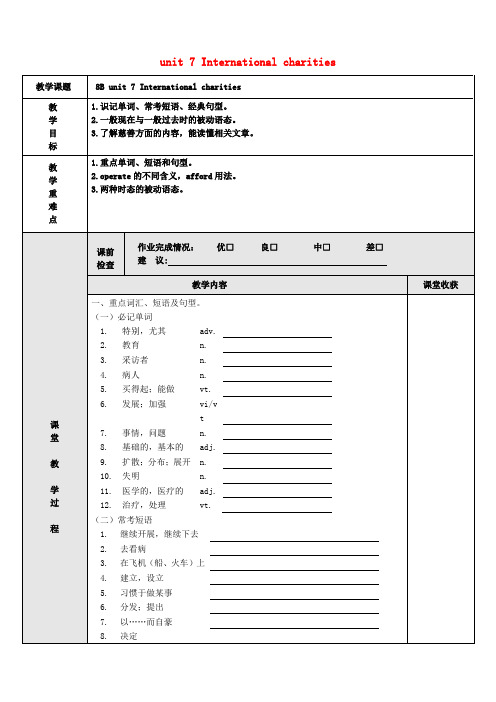
unit 7 International charities我8. prevent the m from getting illness 8. aThe cla课后练习一、单词拼写(10%)1. We should think about continuing to_______(发展) this wonderful project.2. I need two more_______(秘书) to help me finish the task.3. Remember to take the (药) three times a day.4. I really hope there is no_______ (战争) any more in the world.5. It is warm all year round and sometimes is very hot in Kunming, _______ (尤其) in May and June.6. Now I will show you some_______ (基本的) examples of using them.7. Are you ready? The_______ (采访者) have prepared a lot of questions.8. -Can you help me out these leaflets to people in the street?-Sure.9. -What's the with you, Andy?-I'm not getting along well with Laurence and I don't know how to make up with him. .10.-What do children in poor areas need most?- _______. Every child has the right to go to school.二、单项填空(20%)( ) 1. I think it's _______ useful advice, so I will always remember it.A. aB. anC. theD. /( ) 2. The girl is _______ young _______ loo k after herself.A. so; thatB. too; toC. very; toD. so; to( ) 3. English _______ in many countries, but the Chinese _______ their own language.A. speaks; spokenB. is spoken; is spokenC. is spoken; speakD. is spoken; speaks( ) 4. In China, the old _______.A. are taken good care ofB. are taken good careC. is taken good care ofD. is taken good care( ) 5. Our monitor has w on the first prize in the competition, and we are very _______ him.A. busy withB. famous forC. good atD. proud of( ) 6. To protect the environment, most supermarkets have stopped ______ free plastic bags.A. to sendB. sendingC. to provideD. providing( ) 7. Carry _______ while I'm away.A. on with your workB. workingC. on to workingD. with working( ) 8. _______ of the people in the North live on wheat. They live _______ on wheat.A. Mostly; mostB. Most; mostlyC. Mostly; almostD. Most; almost( ) 9. -Nancy, you are going to buy a flat here, aren't you?-Yes, but I can't _______ an expensive one.A. spendB. pay.C. costD. afford( )10. The man had something wrong with his nose so he _______.A. operate onB. was operatedC. was operated onD. operation on( )11.-Is your brother a Swimming Club member?-Yes, he _______ the club three years ago. He _______ a club member for three years.A. joined; has beenB. joined; has been inC. joined in; isD. joined in; has been( )12. The government will _______ more colleges for more students to receive higher education.A. set upB. send upC. set outD. use up( )13. The bird _______ to fly away yesterday.A. let toB. is letC. was letD. was letting( )14. _______ meaningful work it is to raise money for charities !A. HowB. WhatC. How aD. What a( ) 15. John _______ living in the countryside because he _______ the environment there.A. was used to; used toB. is used to; is used toC. used to; is used toD. used to; was used to( )16. We must _______ computer games too much.A. keep students from playingB. prevent students from playingC. stop students from playingD. all the above( )17. The singer sang many pop songs, _______ some of my favourites.A. includeB. includingC. includedD. includes( )18. -How many cakes can I have, Mum?-None, dear. They _______ for your father.A. prepare B prepared C. have prepared D. were prepared( )19.-Is your sister ill? -No, _______, only a little cold.A. serious anythingB. nothing seriousC. serious nothingD. anything serious( )20. -I don't know how to search the Internet. - _______. I'll help you.A. I hope soB. I'm afraid, tooC. Don't worryD. I'm sorry三、动词填空(10%)1. The Olympic Games_______ (hold) every four years.2. -Excuse me. Look at the sign "No Photos". -Sorry, I -_______ (not notice) it.3. Project Hope _______ always_______ (support)by those kind people.4. Many doctors on the flying hospital fly to poor areas_______ (treat) people with eye problems.5. The doctors_______ (operate) on the girl when we got to the hospital.6. -What's your plan for the coming holiday?-I _______ (visit) Beijing if possible.7. Bamboo _______ usually _______ (use) to make kites during Qing Dynasty.8. I'm not familiar with this place. It's the first time I _______ (be) here, you know.9. -When _______ we_______ (meet) tomorrow? -I have no idea.10. -Who_______ (organize) this fashion show?-Millie does.四、完形填空(10%)Charity walks are a great way for a charity to raise money. The charity organizes a time and place for people to meet and decides 1 the walk will be. Most charity walks are 2 20 and 30 kilometres long, but some can be as long as 1,000 kilometres. The charity often advertises the 3 on the television, radio and also in local newspapers so that lots of people can take part in the walk. The charity 4 money through the people's walking in the event. Each person asks his or her friends to sponsor(赞助) them and then 5 the money from them when they finish the walk. 6 , a person might ask their friends to give 5 yuan for every kilometre that he or she walks. This is a good way 'for people to raise money, if they are not very healthy and wonder if they 7 finish the route. There are lots of different charities in today's world, so it is important for a charity to remind(提醒) people about 8 they do. Even though(即使) people might see a charity's logo(标识) often, having a charity walk is a great 9 to remind them about it. When people know what the charity is raising money for, they will donate some money. In this way, the next time those people feel generous, they may decide to give their money to the charity, 10 a different one.( ) l. A. how long B. how soon C. how often D. how much( ) 2. A. either B. both C. among D. between( ) 3. A. game B. sport C. walk D. idea( ) 4. A. runs B. raises C. holds D. asks( ) 5. A. borrows B. gives C. collects D. makes( ) 6. A. But B. Such asC. To tell the truthD. For example( ) 7. A. must B. can C. need D. should( ) 8. A. what B. how C. where D. why( ) 9. A. problem B. way C. road D. hope( )10. A. while B. instead of C. but D. without五、阅读理解(20%)(A)Perhaps your childhood piano lessons made you never want to play the piano again. Perhaps a piano is too expensive for you to buy. Now thanks to a program in Sydney called "Play Me, I'm Yours", people are able to play the piano in public places. for free. They share beautiful music and the program also helps them communicate with each other.Thirty pianos have been placed in different parts of the city including in several parks, at a bus stop and on some streets. The pianos have the logo "Play Me, I'm Yours" on them. People arc invited to play music or sing songs with the pianos. Lots of people have been attracted (吸引) to the program and stopped to watch or play the pianos."Play Me, I'm Yours" is a part of the Sydney Festival. It is a project of the British artist Luck Jerram. He wants to help people in the city connect with each other. He thinks that so many people are sitting in front of computers and busy with their work all hours and they almost have no chance to enjoy music. So the purpose of the project is to help them relax and make new friends.The program "Play Me, I'm yours" has also reached England and Brazil (巴西) before. It was warmlywelcomed there. But its greatest success seems to come at the Sydney Festival. "It's a chance for people to connect with strangers (陌生人) and just have some fun, " Jerram said.( ) 1. According to the first sentence of the passage, your childhood piano lessons may be _______.A. boringB. wonderfulC. interestingD. meaningful( ) 2. Thirty pianos are placed in parts of the city except _______.A. in parksB. at a bus stopC. on streetsD. in a school( ) 3. The purpose of the project is to help people _______.A. sing songsB. play the piano for freeC. relax and make friendsD. enjoy beautiful music( ) 4._______ countries have had the program.A. TwoB. ThreeC. FourD. Five( )5. What can be the title(标题)for the passage?A. Beautiful MusicB. A British Artist, Luck JerramC. The Sydney FestivalD. A Program "Play Me, I'm Yours"(B)Come to Austria(奥地利)Soll is a village in the mountains in western Austria. And the Post Hotel is clean and not expensive. It is opened by a local family. From the hotel you can see the whole village, the forests and the mountains. Temperatures in summer are usually 20 to 25 in the daytime, but much cooler by evening.Enjoy Thailand!When you visit Bangkok in Thailand, don't miss the early morning river boat trip to the Floating Market just outside the city. There you will find-many kinds of fruit and vegetables. And you can pay for them when you sit in your boat. Don't forget your hat: the sun can-be strong and it may be as hot as 40 at noon.Visit Hawaii!Maybe the most beautiful place in Hawaii is Kauai. You can visit its long, sandy beaches in the south and west of the island, and mountains and forests in the north, but don't be surprised if it rains in the centre of the island. Daytime temperatures there are usually around 24 to 26 by the sea, and only a little cooler by late evening.( ) 6. The advertisements above are about _______.A. shoppingB. foodC. travelD. hotels( )7. If you go to Bangkok, you can_______.A.climb mountainsB. enjoy the scenery(景色)of the forestsC.live in the Post HotelD. buy fruit while sitting in your boat( )8. _______ is one way to prevent the strong sunshine in Bangkok.A. Going to the sandy beachesB. Wearing a hatC. Climbing up the mountainsD. Staying in the forests( ) 9. Which place will you choose if you wan-t to visit both mountains and beaches?A. Soll in Austria.B. Bangkok in Thailand.C. The Floating Market.D. Kauai in Hawaii.( )10. According to(根据)the advertisements, we know that _______.A. the hottest travel place is SollB. maybe it often rains in the centre of KauaiC. the Floating Market is in the middle of BangkokD. the temperature isn't very high in these places六、句子翻译(15%)1.上护士被邀请上飞机了解眼部问题。

牛津译林版八年级下册Unit 7《International charities》教学设计3一. 教材分析《International charities》是人教版牛津译林八年级下册Unit 7的一篇阅读课文,主要介绍了国际慈善机构的意义和作用。
本文通过讲述不同慈善机构帮助世界各地需要帮助的人的故事,使学生了解慈善机构的重要性,提高学生的社会责任感和关爱他人的意识。
二. 学情分析八年级的学生已经具备了一定的阅读理解能力,对于生活中的慈善机构有一定的了解,但可能对国际慈善机构的具体情况了解不多。
因此,在教学过程中,教师需要帮助学生更好地理解课文内容,激发学生关爱他人、积极参与慈善活动的热情。
三. 教学目标1.知识目标:学生能够掌握课文中的关键词汇和句型,理解课文大意。
2.能力目标:学生能够运用所学知识,进行简单的阅读理解和口语表达。
3.情感目标:学生能够了解国际慈善机构的意义和作用,培养关爱他人、积极参与慈善活动的意识。
四. 教学重难点1.重点:课文的理解和词汇的掌握。
2.难点:课文中的长句和复杂句子结构的理解,以及如何运用所学知识进行实际的阅读理解和口语表达。
五. 教学方法1.任务型教学法:通过设定各种任务,让学生在完成任务的过程中,自然地学习和掌握知识。
2.情境教学法:创设真实的语境,让学生在特定的情境中学习和运用英语。
3.合作学习法:鼓励学生之间互相合作,共同完成学习任务。
六. 教学准备1.课文原文及配套练习题。
2.与课文内容相关的图片、视频等教学资源。
3.录音机、投影仪等教学设备。
七. 教学过程1.导入(5分钟)利用图片或视频展示一些国际慈善机构正在进行的活动,引导学生关注慈善机构的重要性,激发学生的学习兴趣。
2.呈现(10分钟)老师简要介绍课文内容,然后让学生阅读课文,理解大意。
在阅读过程中,老师可以随时回答学生的问题,帮助学生理解课文。
3.操练(15分钟)学生分角色朗读课文,模仿课文中的对话。
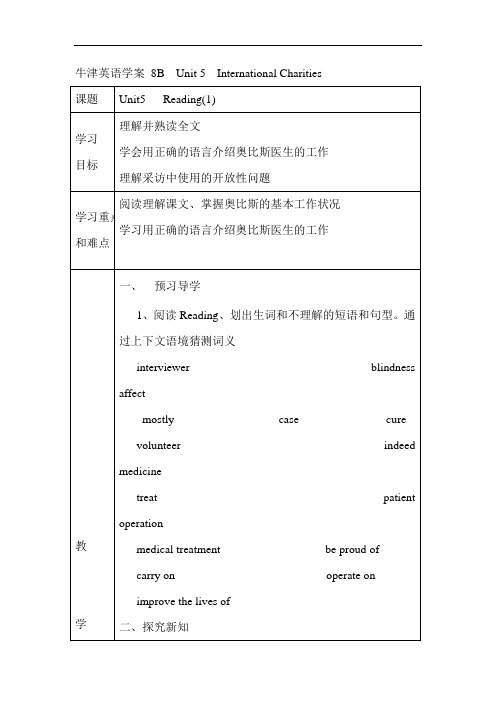
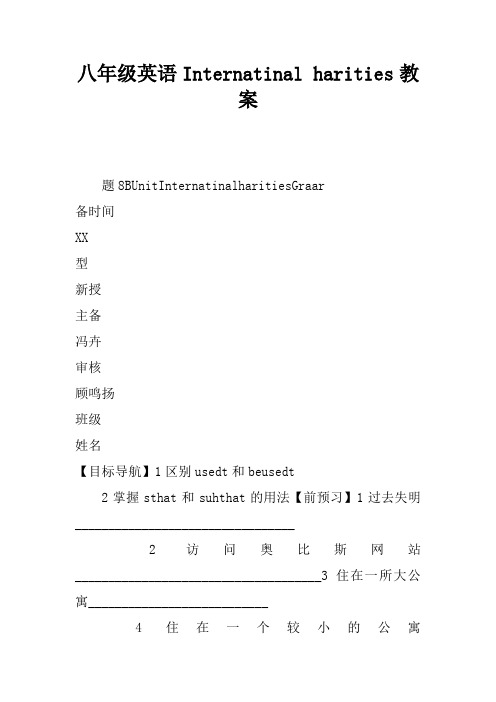
八年级英语Internatinal harities教案题8BUnitInternatinalharitiesGraar备时间XX型新授主备冯卉审核顾鸣扬班级姓名【目标导航】1区别usedt和beusedt2掌握sthat和suhthat的用法【前预习】1过去失明_________________________________2访问奥比斯网站_____________________________________3住在一所大公寓___________________________4住在一个较小的公寓_________________________________许多时间花在奥比斯飞机上__________________6每天治疗很多病人___________________________________7周末和朋友外出___________________________8在大多数周末工作___________________________________9花很多时间去餐馆和电影院_________________10没有以前那么多钱__________________________________11更有意义________________________________12习惯于奥比斯医生这个新工作_________________________13离家很远________________________________14不平常的生活方式___________________________________1电视节目里______________________________16感到很不舒服______________________________________17飞行医生这种生活方式____________________18做一名志愿者医生__________________________________19必须足够的仔细__________________________20一直学习__________________________________________21一个很长的过程__________________________22一个有意义的工作_________________________________【堂检测】预习作业等级:一、选词填空:(10格*=0’)二、用s 和suh填空:(格*10=0’)得分:【后巩固】一、完形填空:二、动词填空:In’treturnthebtubeauseI__________readingitet2arilltellhithenesassnasshe__________hi3IishI__________tthenneda4Ihpehe__________bainaeeHetldehe__________apartthenextevening6HanEnglishrds___________u__________sfar?7Idn’tnifit_______trrIfit________trr,I______therenft8urteahertldusthatthen_____________arundtheearth【能力拓展】一、完成句子:【时反馈】【家庭作业】(选做:A为有能力完成的学生的作业B为本学科学习较困难学生的作业)A完成自主检测本时作业≈背诵本时短语B抄写本时短语一遍≈本单元单词一遍--aiter,thislbster(龙虾)hasnlnela(爪子)--I'srr,sirItusthavebeeninafight--ell,bringetheinne rthen。
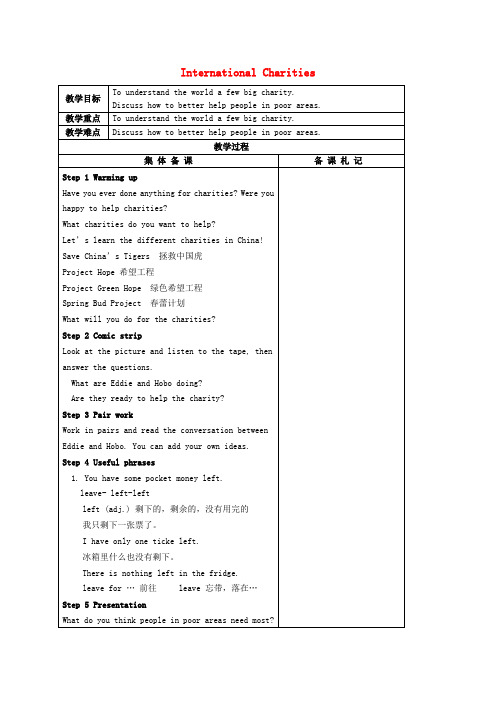
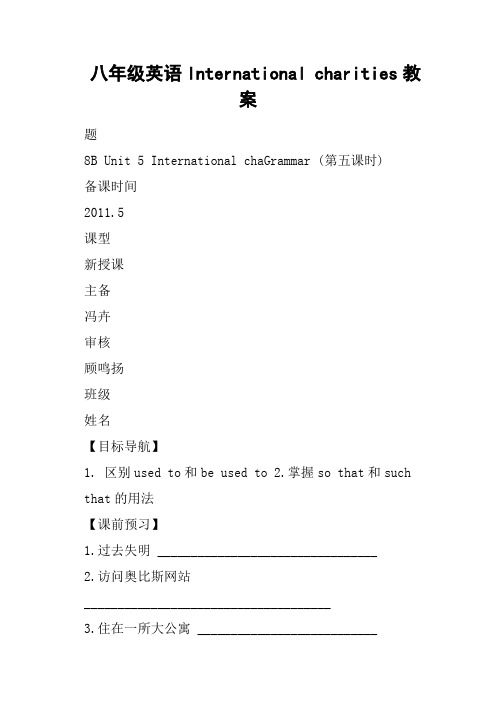
八年级英语International charities教案题8B Unit 5 International chaGrammar (第五课时)备课时间2011.5课型新授课主备冯卉审核顾鸣扬班级姓名【目标导航】1. 区别used to和be used to2.掌握so that和such that的用法【课前预习】1.过去失明 _________________________________2.访问奥比斯网站_____________________________________3.住在一所大公寓 ___________________________4.住在一个较小的公寓_________________________________5许多时间花在奥比斯飞机上__________________ 6.每天治疗很多病人___________________________________7.周末和朋友外出 ___________________________8.在大多数周末工作___________________________________9.花很多时间去餐馆和电影院 _________________10.没有以前那么多钱__________________________________11更有意义 ________________________________ 12.习惯于奥比斯医生这个新工作_________________________13.离家很远 ________________________________14.不平常的生活方式___________________________________15.电视节目里 ______________________________16.感到很不舒服______________________________________17.飞行医生这种生活方式 ____________________18.做一名志愿者医生__________________________________19.必须足够的仔细 __________________________20.一直学习__________________________________________21.一个很长的过程 __________________________22. 一个有意义的工作_________________________________【课堂检测】预习作业等级:一、选词填空:(10格*5=50’)二、用so和such填空:(5格*10=50’)得分:【课后巩固】一、完形填空:二、动词填空:1. I won’t return the bu because I __________ (finish) reading2. Mary will tellws as soon as she __________ (see)I wish I __________ (fly)day.4. I__________ (come) back in a wHe told me he__________ (hold) a paxt evening.6. How many English words ___________ you __________(learn) so far?7. I don’t know if it _______ (rain)w. If it ________ (not rain)w, I ______ (go)ur teacher told ustha_____________ (travel) around the earth.【能力拓展】一、完成句子:【课时反馈】【家庭作业】(选做:A.为有能力完成的学生的作业 B.为本学科学习较困难学生的作业)A. 完成自主检测本课时作业背诵本课时短语B. 抄写本课时短语一遍本单元单词一遍-- Walobster(龙虾) has only one claw(爪子). -- I'It must have been in a fight.-- Well, bringw。
Unit 7 International charities 教案教学目标:知识目标words and phrase in this section.教学重点:知识目标words and phrase in this section.教学难点:To use reported speech without tense change.教学过程:The demands for pre-learning Period 10:I. Look at the contents.II. Try to complete the exercises.教学过程:教师活动方式:Step 1. Greetings:学生活动方式:Greet with the teacher freely.教师活动方式:Step 2 Revision (Free talk ):Have a free talk with the students. Revise something learned before.1.view suffixes ‘-ment’, ‘-ness’, ‘-ion’2. Review the object clause:学生活动方式:Have a free talk with the teacher.教师活动方式:Step 3. Presentation:e.g.1 His name is Tom. I am sure. →I’m sure (that) his name is Tom.2 W hat is your name? I don’t know. →I don’t know what your name is.Presentation T: What does your father do?S1:My father is a worker.T: What does S1 say ? (toSs) What did S1 say just nT& Ss: S1 says that his father is a worker. S1 said that his father is a worker.学生活动方式:Change the sentences.教师活动方式:We can use reported speech to tell people what someone else said. We do not need to change the tense if we are reporting a fact or if the information is still true. However, we may still need to change the pronoun.学生活动方式:Listen and make notes.教师活动方式:1. The teacher told his students that the sun rises in the east and sets in the west.When do you do your homework?2. Divide the class into pairs. Tell students to ask each other the following questions:What is your favourite sport?How do you go to school? Where do you live?Tell students to write down what their partner says using reported speech3. Ask a few students to present information about their partners to listen学生活动方式:Work in pairs.教师活动方式:Go through the information in the four Tip boxes on page 5.Finish the exercises(A1,A2,A3)Ask the students to read their answers。
牛津初中英语8B Unit 5 International charities一、教材分析根据新课标,突出学生自主学习的主体地位原则,培养学生自主、合作、探究精神、突出语言运用能力培养的理念而设计。
《英语课程标准》是以学生“能做某事”的描述方式来设定各级目标要求的。
这就决定了我们在教学中要尽量采用“任务型”的教学途径。
在这一教学环节中,教师的任务就是根据单元和课堂教学内容和目标,给学生设计一个阶段、一个单元和每一课的学习任务、目标,并锁定任务,吸引和组织他们积极参与,通过思考、调查、讨论、交流和合作等方式,学习和使用英语,完成学习任务。
本课内容为牛津初中英语8B第五单元的阅读课,讲的是采访ORBIS的医生。
必须把握两点:一,学生并不熟悉这类课文形式;二,学生也不熟悉本文涉及的慈善机构,学生并不清楚其背景。
慈善机构在当今人们的生活中,尤其是贫困地区人们的生活中起到了越来越重要的作用。
这些机构通过不同的方式帮助世界各地的人们。
本单元就是让学生重点了解UNICEF(联合国儿童基金会)、World Vision(世界宣明会)、ORBIS(奥比斯)、Oxfam(乐施会)、Wide fund for Nature(世界自然基金会)五个国际慈善机构。
激发学生乐于助人的情怀,激励他们好好学习,为贫困地区的人们贡献自己的一份力量。
二、学生分析学生处在价值观与人生观形成的重要时期,在学生掌握一定词汇量与阅读技能的基础上,应注意培养学生乐于助人的精神,激发他们好好学习。
三、教学目标知识目标1、掌握本课中斜体部分单词并识别其他生词:affect, mostly, case, cure, medical,treatment, operation, patient, afford, skill, train, operate, indeed, proud, medicine, treat, improve, carry on, interviewer, blindness, volunteer2、理解对话内容,能够说出ORBIS的作用。
The rain preve nted him from coming.大雨使他不能来。
3. operate做手术,操作,开动a表示做手术;’不及物动词。
表示给某人做手术时,加介词on,女口:The doctor operated on him just now.刚才医生给他做了手术。
b.表示操作或开动(机器)'如:你会操作这台电脑吗?4. proud形容词,骄傲的,自豪的”表示对.... .感到骄傲",常用be proud of.女口:We ‘ re proud of our motherland.我们对我们的祖国感到自豪。
另外,pride名词,骄傲”常用于take pride in sb/sth对“….感到骄傲.,如:She takes pride in her success.Step5 HomeworkORBIS, a charityuses its to v sit poor areastreats people withTeach ing n otes8B Un it 7 Intern ati onal charitiesdoes on the pla^e/n vites local on boardhelps people:eaches themStep 1 Prese ntati on1. Give stude nts a picture, prese nt new words and phrases.2. Give stude nts some passive sentences in the un it, tran slate them into Chin ese.Step 2 Grammar1. 被动语态和主动语态的基本概念当主语是谓语的执行者时,用主动语态。
当主语是谓语的承受者时,用被动语态。
如:We clean the classroom every day.Theclassroom is clea ned (by us) every day.2. 被动语态的基本构成3.被动语态的基本用法1)动作的执行者是泛指或者不言自明时。
八年级英语International charities教案八年级英语international charities目标导航】1. 掌握本课时的重点知识点【课前预习】1.给150个病人做了手术 _____________________2.一天仅做2到3个手术 _______________________________3.做如此重要的工作__________________________4.真的很感激你们 ____________________________________5对我们的读者说 ___________________________6.能够帮助这么多人感到很骄傲 _________________________7.现代化机器设备 ___________________________8.发展的如此迅速 _____________________________________9.治疗和治愈大多数眼疾 _____________________10.改善病人的生活 ____________________________________ 11我们所需要的 ____________________________12.继续开展我们的工作_________________________________13.使病人好转 ______________________________14.通过向奥比斯捐款来支持我们的工作___________________15.不能看见东西的状态 ______________________16.有足够的钱去买东西 ________________________________17.引起某人发生改变 ________________________18.切开某人的身体 ____________________________________19.取出或修补一部分 ________________________20.住院 ______________________________________________21.80%的失明病例 __________________________22.在富裕国家 ________________________________________ 【课堂检测】预习作业等级:一、单项选择:(5格*10=50’)二、填空:(5格*10=50’)1. unicef is an ____________ (国际) organization. it’s very popular.2. the good news is that most of the cases of blindness can __________ (cure).3. your health can be ____________ (影响) by a lot of elements(因素).4. the girl is __________ (感激) to the man because he saved her out of fire.。
Unit 5 International charities一. 教学内容:Unit 5 International charitiesGrammar二. 教学目标:掌握Unit5的词法结构和用法:1. used to do/be used to doing/be used to do2. 句型结构—表建议3. so …that /such…that/ too…to/ enough…to4. 加后缀变名词三. 经典讲解【典型例题】讲解一:used to do sth.sth that happened in the past , but now stops过去常常做某事,过去常常是,表示过去习惯性的动作或状态,但如今已不存在,后面加动词原形。
e.g. :以前我们步行去学校。
We used to walk to school. / We used to go to school on foot.(but we don‟t walk to school now. ).他过去常常志愿为老人做一些工作。
He used to volunteer to do some work for the old.(He doesn‟t do the work any more now. )肯定句:我以前是班长。
I used to be the monitor.否定句:她以前不喜欢戏剧,但是现在很喜欢。
She used not to like drama, but now she quite likes it.疑问句:你以前喝酒厉害吗?Used you to drink a lot?used to do 句式否定句used not to dodidn‟t use to do一般疑问句Used…to do …? Yes,…used. /No,…usedn‟t.Did …use to do? Yes,…did. /No,…didn‟t.他们以前不抽烟。
They used not to smoke. = They didn‟t use to smoke.Simon 以前常和Daniel出去徒步旅行吗?Used Simon and Daniel to go hiking?= Did Simon and Daniel use to go hiking?讲解二:be used to sth /doing sth get used to sth /doing sth习惯于(某事物)/ (做某事) ,to后面加名词,代词或动名词。
Are you used to getting up early?I am used to the work here .I get used to the way of life here.It‟s hard work but I‟m used to it now.我习惯了南京夏天的天气。
I am / get used to the weather in summer in Nanjing .工人们习惯了在嘈杂的环境中工作。
The workers are / get used to working in a noisy room.这些演员已经习惯了四川的辣菜。
The performers have been / got used to the spicy food in Sichuan.马先生很快就适应了在香港靠左行驶。
Mr Ma soon got / was used to driving on the left in Hong Kong.be used to doing 句式否定句be not used to doingHe isn‟t used to getting up early.一般疑问句Be…to doing …?Yes,…be. /No,…be not.Are you used to taking the bus to school?Yes, I am.辨析1:u sed to do…/used to beused to do. . . 过去常常干某事;used to be. . . 曾经是……例如:He used to get up late. 他过去常常晚起。
He used to be a soldier and join in fighting. 他曾经是一名士兵并且参加过战斗。
辨析2:be used to (doing)…/ be used to do (for doing)be used to (doing). . . 习惯于(干)某事;be used to do (for doing). . . 被用来做……e.g. :He is used to (doing) hard work.他习惯于(干)艰苦工作。
The pan can be used to cook (for cooking) eggs.这个平底锅可以用来煎鸡蛋。
Fridge is used to keep fresh. (for keeping fresh)冰箱被用来保鲜。
Water is used to clean the floor.水被用来清洁地板。
Wood is used to make paper. 木头可用于造纸。
【典型例题】一、改为否定句和一般疑问句。
1. Mother used to be so forgetful.2. Scarf used to take a walk.3. He used to get up late.4. He used to be a soldier and join in fighting.5. Scarf is used to taking a walk.6. He is used to a vegetarian diet.7. He is used to (doing) hard work.8. The pan can be used to cook (for cooking)【答案】否定句1. Mother used not to be so forgetful.2. Scarf used not to take a walk.3. He used not to get up late.4. He used not to be a soldier and join in fighting.5. Scarf isn‟t used to taking a walk.6. He isn‟t used to a vegetarian diet.7. He isn‟t used to (doing) hard work.8. The pan can‟t be used to cook (for cooking)一般疑问句1. Did mother use to be so forgetful?2. Used scarf to take a walk?3. Did he use to get up late?4. Used he to be a soldier and join in fighting?5. Is scarf used to taking a walk?6. Is he used to a vegetarian diet?7. Is he used to (doing) hard work?8. Can the pan be used to cook (for cooking)?二、用used to do造句1. He used to live in the city.2. He used to drink Coke every day.3. He used to play the piano at weekends.4. He used to work for a company.5. He used to drive to work.三、三、三、完成下列句子。
1. 他过去早饭常常吃稀饭,现在他吃面条。
He _______ _____ _______ _________ for breakfast very often, but now he has noodles. 2. 你以前常捐钱给无家可归的人吗?______ you ______ ______ money to __________ people?3. 董先生来自南方,所以他很不习惯北方的生活。
Mr Dong ______ ______ the south, so he _____ quite ___ __ the life in the north4. 西方人习惯用刀叉吃饭。
__________ people _____ ______ ______ _______ with knife and fork.5. Sen过去生活在南非,但是现在已经习惯于住在中国了。
Sen _____ ____ ____ in South Africa, but now she ____ _____ _____ _____ _____ in China.6. 如今他给一家大公司干活。
但是他曾经自己经营。
Now he ______ ____ a big firm. But he _____ ___ ____ his own business.7. 他过去因为盲眼病在盲眼学校上学。
He _______ ____ go to school at a school for the blind _______ ____ his _________.8. 我丈夫过去因为全部时间都花在了工作上所以有点胖,现在他已经习惯天天慢跑,所以瘦了点儿。
My husband _______ _____ ____ a little fat because he worked full-time. Now he ____ ______ ____ _________ jogging every day, and he has become a little thinner.【答案】1. used to have porridge2. Used, to donate, homeless3. comes from,isn‟t, used to4. Wester n, are used to eating5. used to live, is already used to living6. works for, used to have7. used to, because of, blindness8. used to be, is already used to四、选择题1. The boy used ____ computer games 3 hours a day.A. playB. playingC. to play2. Microphones ______ your voice sound louder.A. are used to makeB. are used to makingC. used to makeD. used to making3. This old man is used to _____ after supper.A. taking a walkB. to take a walkC. take a walkD. have a walk4. Mum is the busiest in my family, so she ____ early in the morning.A. used to get upB. used to getting upC. is used to get upD. is used to getting up5. We _____ six days a week, but now we all work five days.A. used workB. used to workC. used to workingD. use to work【答案】CAADB五、翻译句子:1. Tom过去早饭常常吃汉堡包。